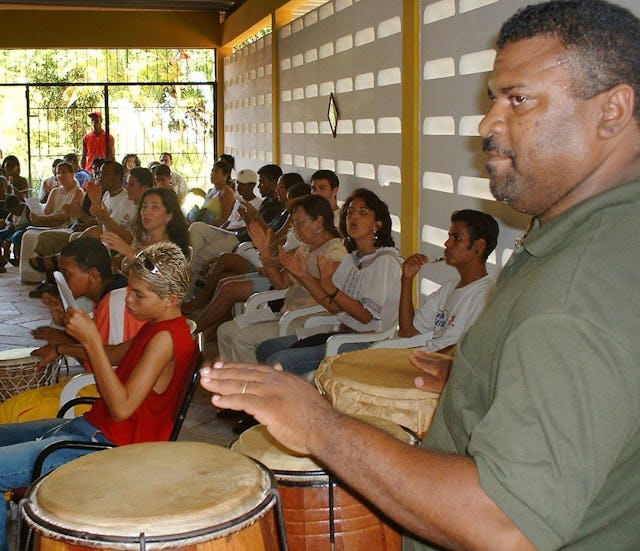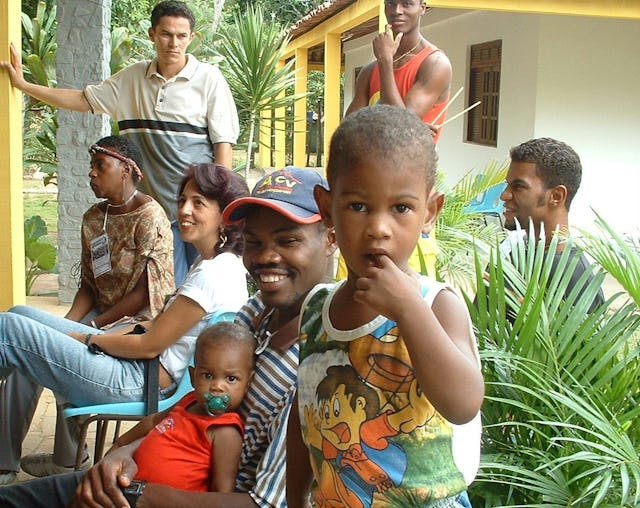In Brazil, African descendants plan for better society
SALVADOR, Brazil — More than 170 men, women and children attended a conference of people of African descent in Brazil to gain a deeper understanding of their heritage and to plan to construct a better society.
The "Afro-Descendants Gathering" was held in the Regional Baha'i Center in Salvador, Bahia, from 31 January to 2 February 2003. It was sponsored by the Regional Baha'i Council for the States of Alagoas, Bahia and Sergipe.
The seventh such gathering in Brazil since 1996, the conference had the aims of increasing the self-esteem of the participants, deepening their spiritual understanding, assisting them in their personal transformation, and promoting the principle of the oneness of humanity.
"The aim was to gain a deeper perception and appreciation of African cultural heritage that had an enormous influence on Brazilian culture during the centuries of slavery," said Mr. Gabriel Marques, a member of the Continental Board of Counsellors, a senior advisory body that forms part of the Baha'i administration.
"Brazil was the last country in the world that abolished the institution of slavery - in 1888," Mr. Marques said. "The wound is still too fresh and the Brazilian population is just beginning to overcome this problem."
In order to better understand racial prejudice and how it operates in today's society, the participants spoke in a session of their personal experiences of day-to-day discrimination.
Then they examined the contributions made by "Afro descendants" to technological and scientific development in both ancient and modern times.
Participants also studied selected Baha'i principles such as the oneness of the human family and the need for "unity in diversity".
In one session, they studied the text where Baha'u'llah compared "the colored people to the black pupil of the eye." (See Note) Two ophthalmologists then explained the vital function of the pupil to the eye, comparing it to the contributions people of color make to humanity.
Participants also discussed how they could build a better society. They concluded they should make greater efforts to promote the moral education of children, study the Baha'i sacred writings regularly, and seek to spiritualize themselves, their families and their communities through participation in devotional meetings and study circles, which involve learning about their own spiritual nature, and acquiring the skills and motivation to take effective action.
The gathering was permeated with music and dance. Istvan Dely, a Hungarian musician who resides in Colombia, was a featured guest.
An accomplished drummer and percussionist, he spoke of the spirituality of the African heritage.
"Not having any books, (Africans) used the power of music and dancing as a channel to express their veneration of the spiritual world," said Mr. Dely, who has been closely involved in the revival and integration of the arts and African percussion in Baha'i study circles in Africa and the Caribbean.
Two special events preceded the gathering. The first was a visit to the region by 14 young American men who had participated in Black Men's Gathering, a Baha'i event held in the United States aimed at rejuvenating the souls of the participants and enkindling in them a spirit of Baha'i service to humanity. They dedicated two weeks to the promotion of community life activities in the area.
The other event was an African mask workshop involving 24 youth from the region. The idea behind it was to develop the individual artistic abilities of the youth and also to learn how to incorporate the arts into study circles.
The masks decorated the venue of the gathering, and the young people who made them explained the feelings or specific virtues they sought to express in their masks.
NOTE: 'Abdu'l-Baha said that his father, Baha'u'llah, had made the comparison between black people and the pupil of the eye, and 'Abdu'l-Baha himself said, in a letter to the first African American Baha'i, Robert Turner: "Thou art like unto the pupil of the eye which is dark in color, yet it is the fount of light and the revealer of the contingent world."
Mr. Turner visited 'Abdu'l-Baha in the Holy Land in 1898-1899. He was the butler of Mrs. Phoebe Hearst, an early Baha'i and mother of the well-known publisher of that name.

